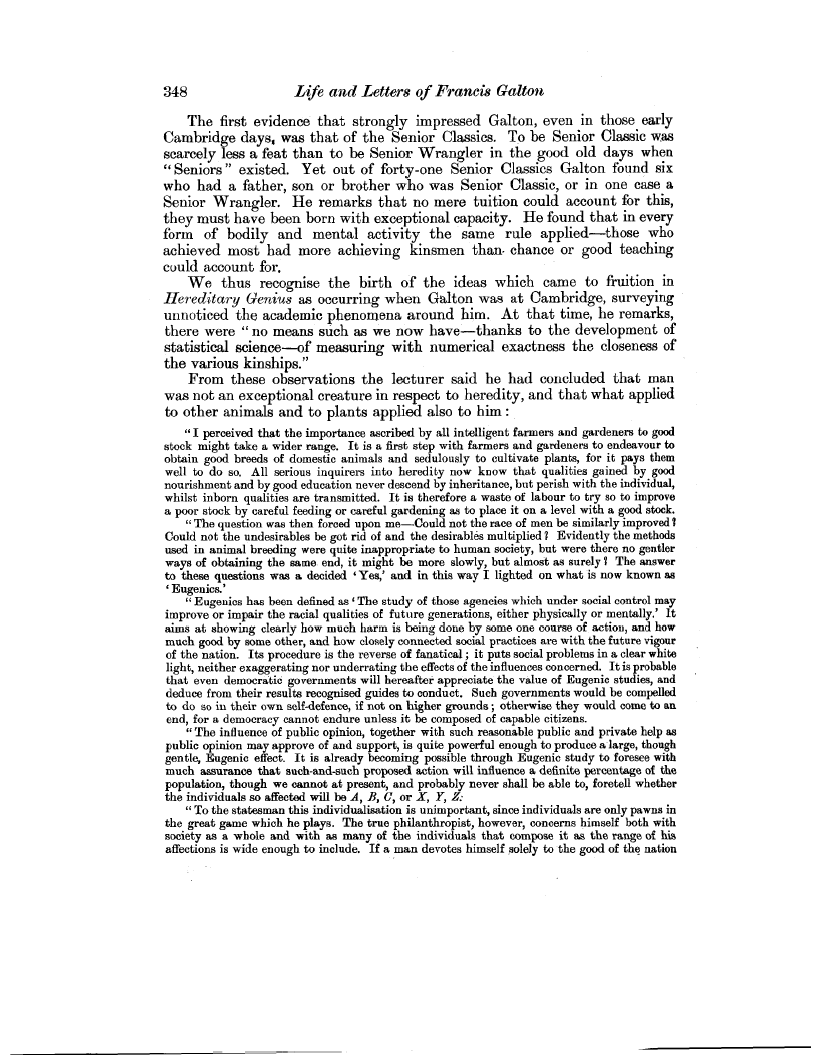| ||||||

OCR Rendition - approximate
348 Life and Letters of Francis Galton The first evidence that strongly impressed Galton, even in those early Cambridge days, was that of the Senior Classics. To be Senior Classic was scarcely less a feat than to be Senior Wrangler in the good old days when " Seniors " existed. Yet out of forty-one Senior Classics Galton found six who had a father, son or brother who was Senior Classic, or in one case a Senior Wrangler. He remarks that no mere tuition could account for this, they must have been born with exceptional capacity. He found that in every form of bodily and mental activity the same rule applied-those who achieved most had more achieving kinsmen than, chance or good teaching could account for. We thus recognise the birth of the ideas which came to fruition in Hereditary Genius as occurring when Galton was at Cambridge, surveying unnoticed the academic phenomena around him. At that time, he remarks, there were " no means such as we now have-thanks to the development of statistical science-of measuring with numerical exactness the closeness of the various kinships." From these observations the lecturer said he had concluded that man was not an exceptional creature in respect to heredity, and that what applied to other animals and to plants applied also to him "I perceived that the importance ascribed by all intelligent farmers and gardeners to good stock might take a wider range. It is a first step with farmers and gardeners to endeavour to obtain good breeds of domestic animals and sedulously to cultivate plants, for it pays them well to do so. All serious inquirers into heredity now know that qualities gained by good nourishment and by good education never descend by inheritance, but perish with the individual, whilst inborn qualities are transmitted. It is therefore a waste of labour to try so to improve a poor stock by careful feeding or careful gardening as to place it on a level with a good stock. " The question was then forced upon me-Could not the race of men be similarly improved 4 Could not the undesirables be got rid of and the desirables multiplied? Evidently the methods used in animal breeding were quite inappropriate to human society, but were there no gentler ways of obtaining the same. end, it might be more slowly, but almost as surely 4 The answer to these questions was a decided `Yes,' and in this way I lighted on what is now known as Eugenics.' "Eugenics has been defined as The study of those agencies which under social control may improve or impair the racial qualities of future generations, either physically or mentally.' It aims at showing clearly how much harm is being done by some one course of action, and how much good by some other, and how closely connected social practices are with the future vigour of the nation. Its procedure is the reverse of fanatical ; it puts social problems in a clear white light, neither exaggerating nor underrating the effects of the influences concerned. It is probable that even democratic governments will hereafter appreciate the value of Eugenic studies, and deduce from their results recognised guides to conduct. Such governments would be compelled to do so in their own self-defence, if not on higher grounds ; otherwise they would come to an end, for a democracy cannot endure unless it be composed of capable citizens. " The influence of public opinion, together with such reasonable public and private help as public opinion may approve of and support, is quite powerful enough to produce a large, though gentle, Eugenic effect. It is already becoming possible through Eugenic study to foresee with much assurance that such-and-such proposed action will influence a definite percentage of the population, though we cannot at present, and probably never shall be able to, foretell whether the individuals so affected will be A, B, C, or % Y, Z:• " To the statesman this individualisation is unimportant, since individuals are only pawns in the great game which he plays. The true philanthropist, however, concerns himself both with society as a whole and with as many of the individuals that compose it as the range of his affections is wide enough to include. If a man devotes himself solely to the good of the nation
|